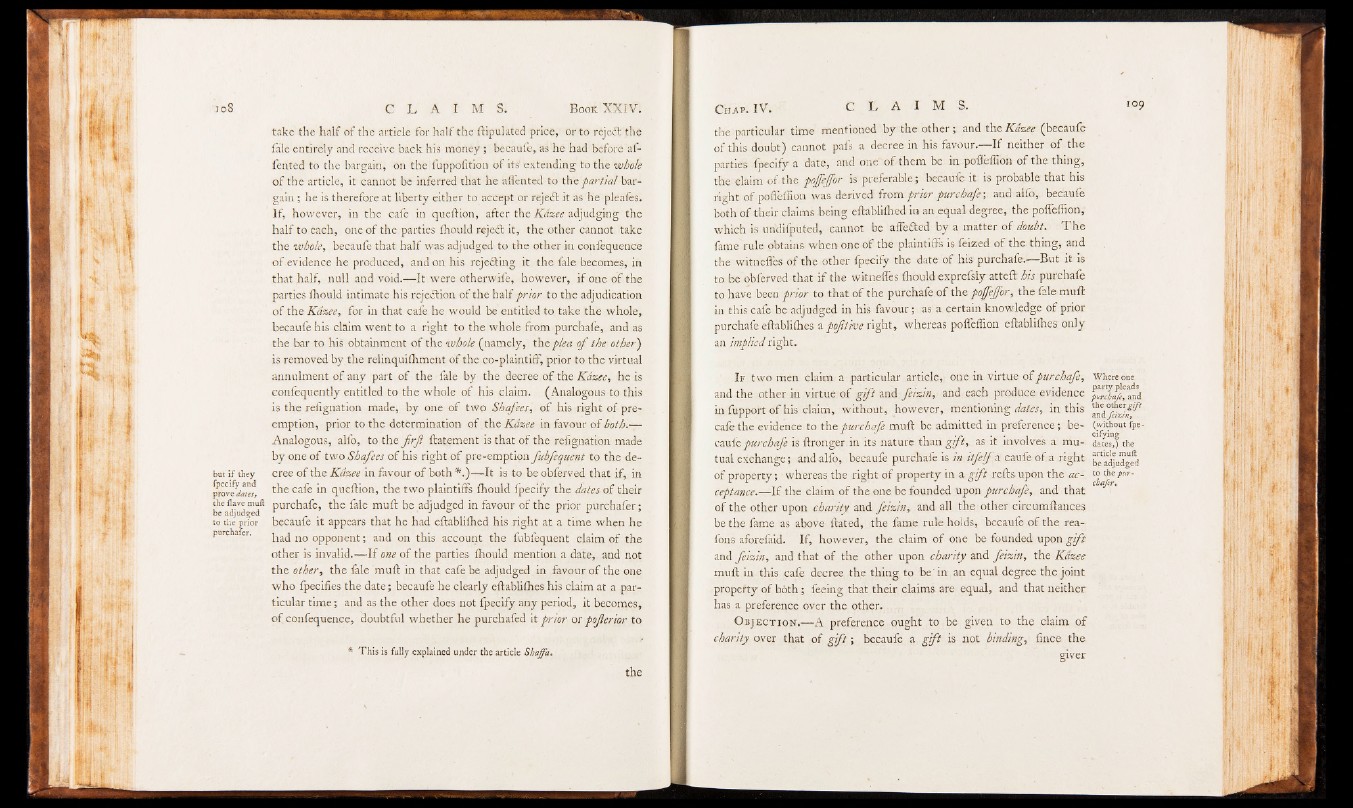
take the half of the article for half the ftipulated price, or to reject the
fale entirely and receive back his money; becaufe, as he had before af-
fented to the bargain, on the fuppofition of its' extending to the whole
of the article, it cannot be inferred that he aflented to the partial bargain
; he is therefore at liberty either to accept or rejedt it as he pleafes.
If, h owever, in the cafe in queftion, after the Kdzee adjudging the
half to each, one of the parties fhould rejedt it, the other cannot take
the whole, becaufe that half was adjudged to the other in confequence
of-evidence he produced, and on his rejedting it the fale becomes, in
that half, null and void.— It were otherwife, however, if one of the
parties fhould intimate his rejection of the half prior to the adjudication
of the Kdzee, for in that cafe he would be entitled to take the whole,
becaufe his claim went to a right to the whole from purchase, and as
the bar to his obtainment of the whole (namely, the plea o f the other)
is removed by the relinquifhmeiit of the co-plaintiff, prior to the virtual
annulment of any part of the fale by the decree of the Kdzee, he is
confequently entitled to the whole of his claim. (Analogous to this
is the refignation made, by one of two Shafees, of his right of preemption,
prior to the determination of the, Kdzee in favour of both.—
Analogous, alfo, to the fir jl ftatement is that of the refignation made
by one of two Shafees of his right of pre-emption fubfequent to the debut
i f they cree of the Kdzee in favour of both *.)-—It is to be obferved that if, in
^rovedatcf, t^le ca^"e *n the two plaintiffs fhould fpecify the dates of their
purchafe, the fale mull be adjudged in favour of the prior purchafer;
to the prior becaufe it appears that he had eftablifhed his right at a time when he
purphafer. ]la(j no opponent; and on this account the fubfequent claim of the
other is invalid.— If one of the parties fhould mention a date, and not
the other, the fale mufl in that cafe be adjudged in favour of the one
who fpecifies the date; becaufe he clearly eftablifhes his claim at a particular
time; and as the other does not fpecify any period, it becomes,
of. confequence, doubtful whether he purchafed it prior or pojlerior to
* T h is is fully explained under the article Shaffa.
the
the particular time mentioned by the other; and the Kdzee (becaufe
of this doubt) cannot pafs a decree in his favour.—If neither of the
parties fpecify a date, and one'of them be in pofleffion of the thing,
the claim of the pojfeffor is preferable; becaufe it is probable that his
right of pofleffion was derived from prior purchafe; and alfo,. becaufe
both of their claims being eftablifhed in an equal degree, the pofleffion,
which is uridifputed, cannot be affedted bya< matter of doubt. The
fame rule obtains when one of the plaintiffs is feized.of the. thing*, and
the witnefles of the other fpecify the date of his purchafe.—But it is
to be obferved that if the witnefles fhould exprefsly atteft his purchafe
to have been prior to that of the purchafe of the poffeffor, the fale mufl:
in this cafe be adjudged in his favour; as a certain knowledge of prior
purchafe eftablifhes zpofitive right, whereas pofleffion eftablifhes only
an implied right.
If two men claim a particular article, one in virtue of purchafe,
and the other in virtue of g ift and feizin, and each produce evidence
in fupport of his claim, without, however, mentioning dates, in this
cafe the evidence to the purchafe muft be admitted in preference; becaufe
purchafe is ftronger in its nature than g ift, as it involves a mutual
exchange; and alfo, becaufe purchafe is in itfe lf a cau feo fa right
of property; whereas the right of property in a g ift refts upon the acceptance.—
If the claim of the one be founded upon purchafe, and that
of the other upon charity, and feizin , and all the other circumftances
be the fame as above ftated, the fame rule holds* becaufe of the rea-:
fons aforefaid. If, however, the claim of one be founded upon g ift
and feizin, and that of the other upon charity and feizin, the Kdzee
muft in this pafe decree the thing to be' in an equal degree the joint
property of both; feeing that their claims are equal, and that neither
has a preference over the other.
O b j e c t i o n .— A preference ought to be given to the claim of
charity over that of g f t ; becaufe a g ift is not binding, fince the
Where one
party pleads
purchafe, and
the other gift
and feizin,
(without fpe-
cifying
dates,) the
article mull
be adjudged
to the purchafer.
s;iver